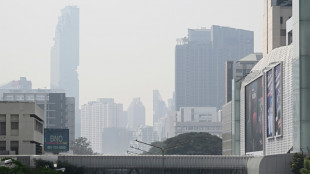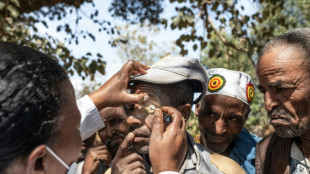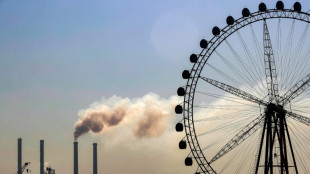
-
 Farrell 'still finding out' about 'intriguing' France at Racing
Farrell 'still finding out' about 'intriguing' France at Racing
-
Taekwondo star Hamidi sacrifices her freedom to battle the Taliban

-
 Misfiring Kane needs to shake off slump as Bayern visit Freiburg
Misfiring Kane needs to shake off slump as Bayern visit Freiburg
-
Bank of Japan hikes interest rate to 17-year high, signals more

-
 Barca hoping to end torrid Liga form against improving Valencia
Barca hoping to end torrid Liga form against improving Valencia
-
Man City start tough run against Chelsea, Spurs aim to halt slide

-
 Lyon fight for return to Champions League amid off-field worries
Lyon fight for return to Champions League amid off-field worries
-
Bangkok air pollution forces 352 schools to close

-
 Asian markets build on Trump rally, yen climbs after BoJ cut
Asian markets build on Trump rally, yen climbs after BoJ cut
-
Despite truce, Lebanese from devastated Naqura cannot go home

-
 Tax change sows anger on England farms
Tax change sows anger on England farms
-
Peers and Gadecki win Australian Open mixed doubles

-
 'I rip out my lashes to ease pain': Eye disease afflicts Ethiopia
'I rip out my lashes to ease pain': Eye disease afflicts Ethiopia
-
Survivors strive to ensure young do not forget Auschwitz

-
 Asian markets build on Trump rally, yen steady ahead of BoJ
Asian markets build on Trump rally, yen steady ahead of BoJ
-
'Nerve-racking': Inside the aerial battle to tame Los Angeles fires

-
 Ice in the sky: Thailand's fight against air pollution
Ice in the sky: Thailand's fight against air pollution
-
Climate change cooks up Japanese 'cabbage shock'

-
 Smog chokes Baghdad as oil-fired factories belch out smoke
Smog chokes Baghdad as oil-fired factories belch out smoke
-
Strong winds wreak havoc before Torrey Pines 2nd rd halted

-
 'Living in a cage': West Bank checkpoints proliferate after Gaza truce
'Living in a cage': West Bank checkpoints proliferate after Gaza truce
-
OpenAI unveils 'Operator' agent that handles web tasks

-
 Bamboo farm gets chopping for US zoo's hungry new pandas
Bamboo farm gets chopping for US zoo's hungry new pandas
-
Fear in US border city as Trump launches immigration overhaul

-
 Red herring: Why Trump wrongly blames a fish for LA wildfires
Red herring: Why Trump wrongly blames a fish for LA wildfires
-
Colman kicks off Sundance as film world reels from LA fires

-
 Alien hunting? Look under sea, says Republican congressman
Alien hunting? Look under sea, says Republican congressman
-
242 mn children's schooling disrupted by climate shocks in 2024: UNICEF

-
 Washington's 'Terminator' Daniels one win away from NFL history
Washington's 'Terminator' Daniels one win away from NFL history
-
US Republicans pressure Democrats with 'born-alive' abortion bill

-
 Djokovic faces Zverev semi-final test in pursuit of 25th Slam title
Djokovic faces Zverev semi-final test in pursuit of 25th Slam title
-
Trump says will demand interest rates drop 'immediately'

-
 Man Utd should never get used to losing, says Fernandes
Man Utd should never get used to losing, says Fernandes
-
Colombia asks Venezuela to help quell border violence

-
 Wembanyama dazzles Paris crowd as he leads Spurs to easy win
Wembanyama dazzles Paris crowd as he leads Spurs to easy win
-
Trump Davos address lifts S&P 500 to record, dents oil prices

-
 Man Utd, Spurs enjoy Europa League boost
Man Utd, Spurs enjoy Europa League boost
-
Fernandes hands Man Utd dramatic victory over Rangers

-
 Director of apocalyptic Sundance film lost home in LA fires
Director of apocalyptic Sundance film lost home in LA fires
-
Trump orders release of last JFK, RFK, King assassination files

-
 Wembanyama delights Paris crowd as he leads Spurs to easy win
Wembanyama delights Paris crowd as he leads Spurs to easy win
-
US lawmakers advance forest management bill as fires scorch LA

-
 Trump declassifies JFK, RFK, Martin Luther King Jr assassination files
Trump declassifies JFK, RFK, Martin Luther King Jr assassination files
-
World champion Neuville holds slim lead in Monte Carlo Rally

-
 Indonesia, France to sign deal to transfer Frenchman on death row
Indonesia, France to sign deal to transfer Frenchman on death row
-
Gaza hostage families conflicted over those not on release list

-
 Rivals Bills and Chiefs clash again with Super Bowl on the line
Rivals Bills and Chiefs clash again with Super Bowl on the line
-
Ainslie no longer with INEOS Britannia after America's Cup defeat

-
 Between laughs and 'disaster', Trump divides Davos
Between laughs and 'disaster', Trump divides Davos
-
New Zealand star Wood signs new two-year deal with Nottingham Forest


242 mn children's schooling disrupted by climate shocks in 2024: UNICEF
Extreme weather disrupted the schooling of about 242 million children in 85 countries last year -- roughly one in seven students, the UN children's agency reported Thursday, deploring an "overlooked" aspect of the climate crisis.
Heat waves had the biggest impact, the report showed, as UNICEF's executive director Catherine Russell warned children are "more vulnerable" to extreme weather.
"They heat up faster, they sweat less efficiently, and cool down more slowly than adults," she said in a statement.
"Children cannot concentrate in classrooms that offer no respite from sweltering heat, and they cannot get to school if the path is flooded, or if schools are washed away."
Human activity, including the unrestricted burning of fossil fuels over decades, has warmed the planet and changed weather patterns.
Global average temperatures hit record highs in 2024, and over the past few years they temporarily surpassed a critical 1.5 degrees Celsius warming threshold for the first time.
That has left the wet periods wetter and the dry periods dryer, intensifying heat and storms and making populations more vulnerable to disasters.
The 242 million figure is a "conservative estimate," the UNICEF report said, citing gaps in the data.
Students from kindergarten to high school saw classes suspended, vacations moved, reopenings delayed, timetables shifted and even schools damaged or destroyed over the year due to climatic shocks, the available data showed.
At least 171 million children were affected by heat waves -- including 118 million in April alone, as temperatures soared in Bangladesh, Cambodia, India, Thailand and the Philippines.
In the Philippines in particular thousands of non-air conditioned schools were closed, with children at risk of hyperthermia.
- Risk rises with temperatures -
September, which marks the start of the school year in many countries, was also heavily impacted.
Classes were suspended in 18 countries, notably due to the devastating typhoon Yagi in East Asia and the Pacific.
South Asia was the region hardest hit by climate-related school interruptions, with 128 million schoolchildren affected.
India had the most children affected -- 54 million, mainly by heat waves. Bangladesh had 35 million also affected by heat waves.
The figures are likely to rise in coming years as temperatures continue going up, with half the world's children -- around one billion -- living in countries at high risk of climate and environmental shocks.
If the emission of greenhouse gases continues on its current trajectory, eight times as many children will be exposed to heat waves in 2050 as in 2000, according to UNICEF projections.
More than three times as many would be exposed to extreme floods and 1.7 times more to wildfires, the projections showed.
Beyond the immediate impacts, UNICEF voiced fears that the damage could increase the risk of some children -- girls in particular -- dropping out of school altogether.
Already, some two-thirds of children around the world cannot read with comprehension by age 10, it said, adding: "Climate hazards are exacerbating this reality."
Education is one of the services most frequently disrupted by climate hazards, Russell said.
"Yet it is often overlooked in policy discussions," she warned. "Children's futures must be at the forefront of all climate-related plans and actions."
UNICEF called for investment in classrooms that are more resistant to climate hazards.
T.Sanchez--AT
